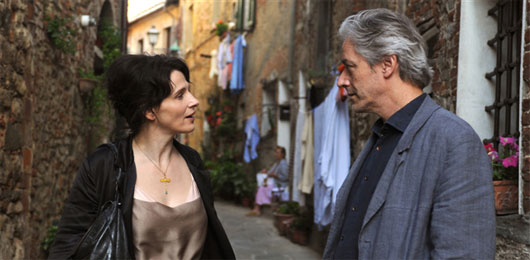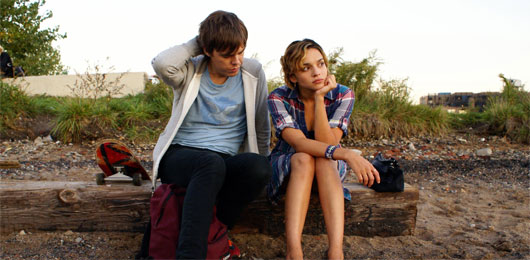 One of the most visually thrilling, baffling and technically marvellous films in cinemas long history gets the directors cut treatment 35 years after Lang died. The reason is a discovery in a small museum in Buenos Aires of 25 minutes of footage long thought to be lost after the original print was butchered by Paramount for the US release. The lost footage has been re-inserted it is dotted throughout the film rather than one sequence and as a result some of the visuals are grainier than others.
One of the most visually thrilling, baffling and technically marvellous films in cinemas long history gets the directors cut treatment 35 years after Lang died. The reason is a discovery in a small museum in Buenos Aires of 25 minutes of footage long thought to be lost after the original print was butchered by Paramount for the US release. The lost footage has been re-inserted it is dotted throughout the film rather than one sequence and as a result some of the visuals are grainier than others.
The other additional feature for this release is the new recording of the original score by Gottfried Huppertz, and newly-translated subtitles which are much clearer than before. Its a long way from the ghastly release in 1984 which had a Giorgio Moroder score with Bonnie Tyler and Adam Ant, and with the film itself colourised sacrilege.
All of this adds up to a simply thrilling release, which still marvels on every viewing. Langs film is set in a nightmarish future world in which worker drones drive huge, seemingly pointless steam machines while an elite live in beautiful art deco apartments and enjoy decadent lives of leisure. The industrialist Joh Fredersen seems to run the show, but when his son Freder meets a mysterious woman the facade cracks. Freder, a dandy if ever there was one, follows Maria down into the bowels of the machine-driven city and, shocked by the repetitive, soul-sapping labour he sees, starts what is basically a workers revolution. When Fredersen gets wind of this he orders a mad inventor to turn his robot into a vision of Maria the famous transformation scene.
Its amazing how influential the film has become over the years. Langs cityscape, with trains and cars zooming across a giant, glass-fronted tower of Babel, still takes the breath away, as does all of the interior design. Fredersens office is a state of the art Art Deco classic and, if his desk still exists, it should be in the Design Museum. Then theres the robot has a sexier metal beast ever been seen in the cinema? The opening montage, of the worker drones being replaced, marching heads down along prison-like corridors, is much-imitated but never bettered this was 1927, for goodness sake. Freders cry, after taking the place of a drone, of has 10 hours ever passed so slowly has been echoed by every factory worker since.
The only criticisms are the corny ending, but that has been generally aimed at Langs wife Thea von Harbou for her insistence on a slightly too neat compromise he divorced her in unhappy circumstances a few years later (presumably not because of the end of Metropolis though). The only other real piece of mud slung at the film was it was one of Hitlers favourite films. Joseph Goebbels, hugely impressed by Langs technical genius, offered him the post of head of film in Germany. Lang said he fled to Paris overnight, but this has been disputed what is certain is that Lang never took up the role and did eventually flee to America, where he made several classic film noirs. Superb though some of these were, it is perhaps Metropolis that he will always be associated with. Now, with its additional 25 minutes, it makes a lot more sense storywise, and so is as near to Langs vision as we are ever likely to get.
Overall Verdict: The definitive version of Langs tale, which looks as marvellous and mind-boggling as it must have looked in 1927. An absolute classic.
Reviewer: Mike Martin
 In 1995 Richard Linklater wrote and directed the delightful Before Sunrise, a film consisting of little more than a man and woman wandering around Vienna discussing the meaning of life and love. Nine years later its star Julie Delpy wrote a powerful, surprisingly profound sequel, Before Sunset, with her and Ethan Hawke walking the streets of Paris this time. That was pretty much the full stop on talkie films with a couple wandering around a pretty location wondering what it all means until now, with Kiarostamis variation on the theme.
In 1995 Richard Linklater wrote and directed the delightful Before Sunrise, a film consisting of little more than a man and woman wandering around Vienna discussing the meaning of life and love. Nine years later its star Julie Delpy wrote a powerful, surprisingly profound sequel, Before Sunset, with her and Ethan Hawke walking the streets of Paris this time. That was pretty much the full stop on talkie films with a couple wandering around a pretty location wondering what it all means until now, with Kiarostamis variation on the theme. While a little rough around the edges, Wah Do Dem is the sort of film that makes you wonder why more micro-budget movies cant be like this. By all rights it shouldnt work, as not a huge amount seems to happen and its all very mumblecore, but the film has a real immediacy and is helped enormously by the unaffected performance of the lead character, played by Sean Bones.
While a little rough around the edges, Wah Do Dem is the sort of film that makes you wonder why more micro-budget movies cant be like this. By all rights it shouldnt work, as not a huge amount seems to happen and its all very mumblecore, but the film has a real immediacy and is helped enormously by the unaffected performance of the lead character, played by Sean Bones. If life, as it appears in Scott Pilgrims world, was like a video game, imagine how happy wed all be. Extra lives floating around in case of an accident, enormous floating text to signify our achievements. Hell, you could level up, World of Warcraft style, just by completing everyday tasks. ALEX TOOK OUT THE BINS! +3 Stamina! The underlying concept though would be that even the skinniest nerd in town could dish out painful justice to wrong-doers in unfeasibly cool set-pieces. Being of the slightly underfed, geeky persuasion myself, its not difficult to see why I find the idea of Scott Pilgrim so instantly appealing.
If life, as it appears in Scott Pilgrims world, was like a video game, imagine how happy wed all be. Extra lives floating around in case of an accident, enormous floating text to signify our achievements. Hell, you could level up, World of Warcraft style, just by completing everyday tasks. ALEX TOOK OUT THE BINS! +3 Stamina! The underlying concept though would be that even the skinniest nerd in town could dish out painful justice to wrong-doers in unfeasibly cool set-pieces. Being of the slightly underfed, geeky persuasion myself, its not difficult to see why I find the idea of Scott Pilgrim so instantly appealing.  Mother is perhaps a slightly surprising move for Bong Joon-Ho, the South Korean director who broke records in his home country and attracted the attention of Hollywood with his monster movie, The Host, in 2006 (indeed hes rumoured to currently be working on an English-language film that will be produced by JJ Abrams). Mother is almost the opposite of a monster movie, a relatively small scale drama/thriller/murder-mystery/character study, concentrating on a middle-aged woman.
Mother is perhaps a slightly surprising move for Bong Joon-Ho, the South Korean director who broke records in his home country and attracted the attention of Hollywood with his monster movie, The Host, in 2006 (indeed hes rumoured to currently be working on an English-language film that will be produced by JJ Abrams). Mother is almost the opposite of a monster movie, a relatively small scale drama/thriller/murder-mystery/character study, concentrating on a middle-aged woman. The great Jacques Tatis last script has finally been brought to life by the creator of the marvellous Belleville Rendez-Vous, surely a marriage made in heaven. Well, not quite actually. Chomets animated version brings back some of Tatis charm and magic, but the story never quite takes off and is too downbeat to really be as warm as it needs to be.
The great Jacques Tatis last script has finally been brought to life by the creator of the marvellous Belleville Rendez-Vous, surely a marriage made in heaven. Well, not quite actually. Chomets animated version brings back some of Tatis charm and magic, but the story never quite takes off and is too downbeat to really be as warm as it needs to be.
You must be logged in to post a comment.